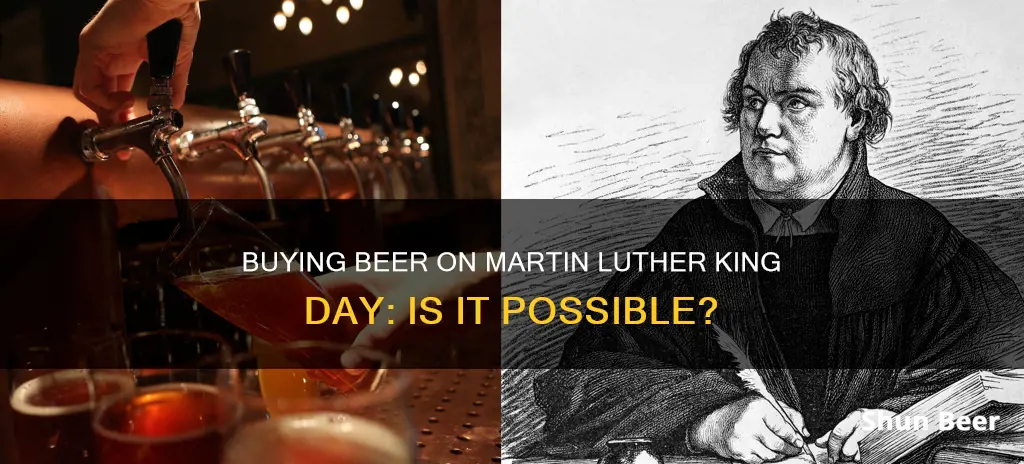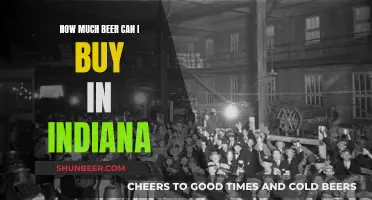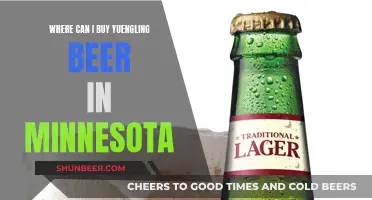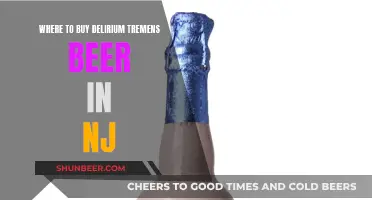
Martin Luther King Day is a federal holiday in the United States, and many businesses are closed. However, some states have specific laws regarding the sale of alcohol on this day. For example, in Pennsylvania, it was only in 2017 that state stores selling alcohol were allowed to open on Martin Luther King Day for the first time. On the other hand, some companies have recently started giving their employees the day off, with some encouraging them to participate in service activities.
What You'll Learn

Beer sales on MLK Day in Pennsylvania
Beer sales on Martin Luther King (MLK) Day in Pennsylvania have been allowed since 2017. This was the result of a new state law, Act 39 of 2016, which allowed Pennsylvania Fine Wine & Good Spirits stores to be open on MLK Day, Presidents' Day, Memorial Day, and Independence Day.
Prior to this, state stores were banned from opening on holidays. The change in legislation meant that, for the first time, Pennsylvanians could buy beer and other alcoholic beverages at state stores on MLK Day.
The new rule only impacts stores that are normally open on Mondays, so if a store is usually closed on Mondays, it will remain closed on MLK Day.
Pennsylvania has some of the most restrictive liquor laws in the United States, with different rules depending on the type of establishment. Beer distributors, for example, have the fewest restrictions and can sell beer in a variety of quantities, including kegs, cases, 12-packs, and six-packs. On the other hand, grocery stores have a maximum limit of 192 fluid ounces of beer per transaction.
The Best Stores to Buy Fever-Tree Ginger Beer
You may want to see also

MLK Day as a company holiday
Martin Luther King Jr. Day (MLK Day) is a federal holiday in the United States, observed on the third Monday of January each year. While it is a public holiday for government employees, private companies are not mandated to give their employees the day off.
In 2018, 42% of employers in the United States gave employees the day off, according to Bloomberg Law. This figure is supported by a Bloomberg BNA study, which found that 37% of employees received a paid day off in 2018, a number that has hovered between 30% and 37% over the past five years. Civil and nonprofit organizations were the most likely to give employees the day off, with 72% doing so. In contrast, only 16% of manufacturing businesses gave employees the day off.
The reasons for not providing the day off vary, but they include the recent addition of the holiday and its proximity to the holiday period between Christmas and New Year's Day. The New York Stock Exchange and NASDAQ are closed for trading on MLK Day, and banks are generally closed. Many schools and universities are also closed for classes, while others remain open but may hold seminars or celebrations of Martin Luther King Jr.'s message.
Some companies have chosen to allow employees to volunteer on MLK Day, in recognition of Martin Luther King Jr.'s desire to positively impact communities. Others have designated MLK Day as a floating or movable holiday.
Buying Beer: Can You Purchase Directly from Distributors?
You may want to see also

Beer and the Protestant Reformation
The Protestant Reformation, launched by Martin Luther 500 years ago, not only changed the way Europe worshipped but also impacted a drink beloved throughout the world, especially in Luther's native Germany: beer.
In the 16th century, the Catholic Church had a monopoly on gruit, a mixture of herbs and botanicals used to flavour and preserve beer. The church taxed gruit, further enriching itself and angering Martin Luther, who was an acknowledged beer drinker. In promoting the use of hops in beer, Luther and his followers were rebelling against the Catholic Church. Hops were not taxed, grew plentifully, and had excellent preservative qualities. Beer flavoured with hops could travel well and became a unit of international trade, symbolizing the growing business class, which was connected to the Protestant work ethic and capitalism.
The promotion of hops in beer was also an act of defiance against the Catholic Church. In the 12th century, Hildegard, a German mystic and abbess, pronounced that hops were unhealthy, saying they "make the soul of a man sad and weigh down his inner organs". Thus, by using hops instead of herbs, Protestant brewers were able to thumb their noses at Catholicism.
Luther would have relished his role in promoting hops. He was a stout, sensual, and gregarious monk who loved good beer. He often mentioned beer in his letters, praising the beer of Torgau as finer than wine and expressing his longing for his wife Katharina's homebrew. Luther's wife, Katharina von Bora, was an intelligent, talented, and exceptionally competent woman. She managed the large Luther household, and to her husband's delight, she opened a brewery that produced thousands of pints of beer each year.
So, while Martin Luther may not be the patron saint of beer, he certainly played a significant role in changing the way beer was brewed and consumed in Europe.
Best Root Beer Barrel Candy: Where to Buy?
You may want to see also

Beer in medieval Germany
In medieval Germany, beer was a major part of the culture, as it was in many parts of the world. The history of beer and brewing in Germany dates back to the Middle Ages, when it was common for households, particularly women, to brew their own beer. The quality of drinking water was often poor, so beer, which was boiled, was considered cleaner and safer to drink.
The relation between bakers and brewers, which dates back to ancient times, continued into the Middle Ages. Bakers and brewers were often part of the same guild, and the heat from the bakery was used to dry the malt. In some cities, such as Nuremberg, the two professions were combined, while in others, such as Freiberg, Krakau, and Straubing, they were separate.
Brewing techniques during this time were quite different from today. Beer was often sour-tasting due to infection, and this was attributed to evil magic or bad demons. Fermentation was believed to be caused by God. The "Hanse", a city and trade union in northern Germany, shipped beer throughout Europe, though the long transport ways often resulted in less-than-perfect beer quality.
The types of beer consumed in medieval Germany also differed from today's varieties. Bottom-fermented beers were predominant in Nuremberg, and beer drinkers distinguished between red beer, white beer, and wheat beer. Red beer refers to dark beers, similar to today's smokebeer from Bamberg, while white beer corresponds to the modern "Helles". Wheat beer, likely introduced from the Netherlands, was similar to the current "Weißbier" in Bavaria.
The social structure of medieval Germany also played a role in beer consumption and production. After the decline of the Roman Empire and the time of migration, Europe entered a "dark epoch" known as the Dark Ages. Life was difficult and marked by a constant struggle for survival. Most people worked on the land of the lord or monastery and had to give up a portion of their crops as a form of tax. Specialization was limited, and farmers were largely self-sufficient, with baking and brewing common practices in households.
The formation of guilds also influenced the beer industry. As new cities were founded and populations grew, various professions became overcrowded, leading to the formation of trade guilds to protect their interests. Brewers were among the first to establish guilds, which set standards for quality, prices, and training of apprentices.
Yuengling Beer: Available in Illinois?
You may want to see also

Beer and monasteries in Britain
Monks are known to have brewed beer in Europe as far back as the 9th century, with the earliest known drawings of a modern brewery being made in 829 AD as part of architectural plans for St Gallen monastery in Switzerland. However, the suppression of monasteries under Henry VIII in Britain put a stop to monastic brewing in the country. It wasn't until the 21st century that Britain got its first Trappist brewery.
Tynt Meadow
In 2018, monks at Mount Saint Bernard Abbey in Leicestershire, a monastery established in 1835, revealed their Tynt Meadow beer, the world's first English Trappist Ale. The name comes from the meadow where the monastery was originally founded. The beer is a strong, dark ale with rich fruitcake flavours and a subtle molasses-like sweetness, with hints of aniseed and marzipan, and a noticeably hoppy finish. It has an ABV of 7.4%.
The recipe for the beer owes more to the English brewing style than that of its famous Trappist brethren. The monks were advised not to brew a Belgian imitation but to make something local and drawing on local tradition. The Abbot of Mount Saint Bernard, Father Erik, explained that they wanted to make something reasonably strong and dark, and so they tried different beer styles until they came up with something they were happy with.
The beer's branding is also rather English but takes into account the fact that the monastery is part of the Order of Cistercians of the Strict Observance (Trappists). The label draws on 12th-century script further developed by the artist Anselm Baker, who was also a brother at Mount Saint Bernard. The logo is a sketch of the three Lancet windows on the monastery's church, designed by Augustus Pugin. The label also features an image of the rural Leicestershire landscape in which the monastery sits.
Ampleforth Abbey Beer
Although not brewed within the walls of a Trappist monastery, and therefore not able to use the 'Authentic Trappist Product' trademark, Ampleforth Abbey Beer is another example of monastic brewing in Britain. The Ampleforth Abbey in North Yorkshire was established by a group of monks who fled to England after the Reformation and continued brewing their sparkling biere anglaise.
A Brief History of Monastic Brewing
Monastery brewhouses from different religious orders have existed across Europe since the Middle Ages. Monks created brewing as we know it, with the first large-scale breweries in Europe, and they have made many advances in brewing techniques and technology. However, the French Revolution, the collapse of the Holy Roman Empire, and the Napoleonic Wars shuttered Europe's monasteries, and monastic brewing all but disappeared.
In the 19th century, a couple of dozen monastic breweries reopened, and today monastic beer is experiencing a renaissance, with monks experimenting with brewing or forming partnerships with secular brewers. Germany has the strongest continuous practice of monastic brewing, dating back over a thousand years.
Beer Buying with a Suspended ID: What You Need to Know
You may want to see also
Frequently asked questions
Yes, you can buy beer on Martin Luther King Day in Pennsylvania.
Yes, you can buy beer on Martin Luther King Day in Kansas.
It depends on the company you work for. Some companies have started to give employees Martin Luther King Day off, while others do not.
Yes, you can buy beer on Martin Luther King Day in Massachusetts.
Yes, you can buy beer on Martin Luther King Day in New York.







